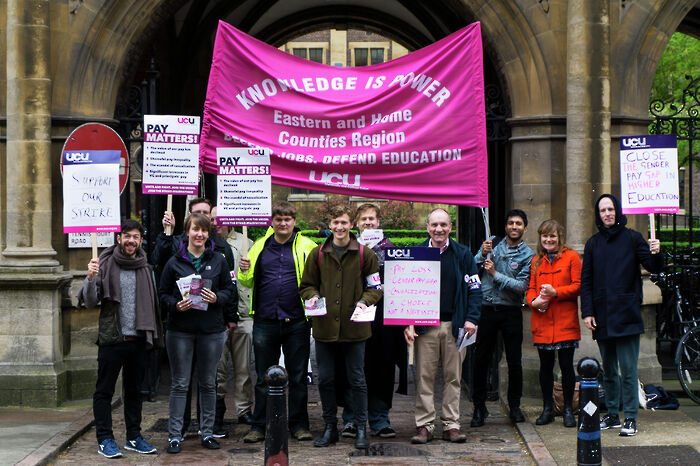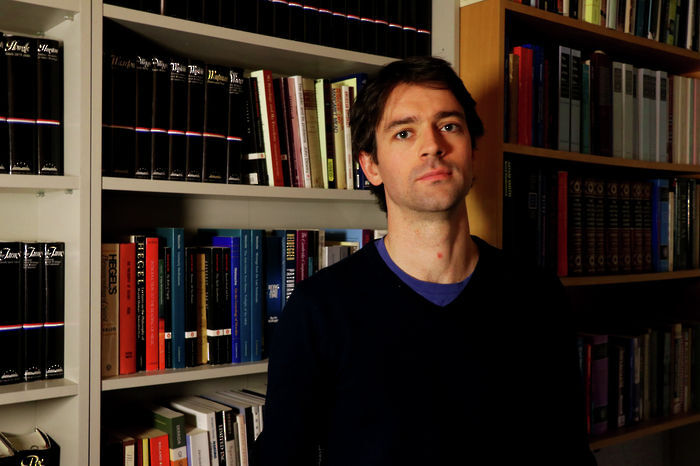Cambridge’s role in pension dispute criticised by staff
Analysis by an LSE professor alleges attempts by Oxford and Cambridge to push for closure of defined benefit pension scheme

Analysis of a leaked Universities UK (UUK) document has revealed the University of Cambridge’s key contribution to proposed changes to the Universities Superannuation Scheme (USS), which have provoked staff strike action across 61 universities nationwide.
Michael Otsuka, a philosophy professor at the London School of Economics, published an article on Monday accusing Oxford and Cambridge universities of pushing for the end of the USS’ defined benefit pension scheme in an attempt to reduce their own financial liabilities.
UUK’s plan to replace defined benefit for income below £55,000 with a defined contribution scheme for all salary levels has been widely rebuked by the University and College Union (UCU), who represent university employees in the ongoing pensions dispute. Whereas defined benefit schemes offer a minimum guaranteed retirement income, defined contribution schemes depend on returns from employees’ stock market investment with no minimum guarantee, and are therefore considered more risky and less generous pensions. Defined benefit, on the other hand, carries a higher level of financial risk for the employer.
The distribution of risk appears as a key theme in Professor Otsuka’s analysis of Oxford and Cambridge’s attitudes towards the USS. In particular, he refers to figures from a leaked UUK report on employer responses to a 2016 USS survey, in which 75% of ‘Oxbridge’ institutions – including the Universities and their constituent colleges separately – reported that they would prefer to take financial control of their own liabilities, compared with 24% of other USS universities. Furthermore, 73% said they would support the legal separation of each institution’s assets and liabilities, compared with 14% of other USS institutions.
Currently, the USS operates a “last man standing” arrangement, where any financial shortfall arising from a member institution going bankrupt would be covered by increased contributions across the remaining institutions intended for deficit recovery. In its submission to the September 2017 USS consultation, the University of Cambridge wrote that it has a “strong preference” for sectionalisation of assets and individual separation of liabilities, and would seek to “reduce the level of investment risk that employers carry” as a secondary option.
However, Professor Otsuka argues that ‘Oxbridge’ institutions have been operating with an “exaggerated impression of the genuine risks to themselves” presented by the “last man standing” arrangement, referring to a 2016 report which states that even if the largest USS institution by payroll were to default, the increase in contributions from remaining institutions would be only 0.1% of their annual payroll.
He further alleges that, due to the high cost to individual institutions of buying out of the defined benefit scheme, Oxford and Cambridge have resorted to “pushing for its closure across all 68 pre-1992 universities, with the upshot that everyone leaves it”. He points to their role as among the most “prominent” of the 42% of institutions who rejected the level of investment risk proposed in USS’ September 2017 actuarial valuation, which resulted in a £2.4 billion increase in forecast deficit.
A spokesperson for the University said that while it did “highlight concerns” surrounding the “last man standing” arrangement, it “is not pushing to leave USS”.
They added: “Ultimately, the ability of individual institutions to influence the valuation process is limited because the USS trustee - which manages the scheme for all member universities – needs to meet a level of prudence that is acceptable to the Pensions Regulator.”
Speaking to Varsity, Cambridge UCU’s Branch Secretary Dr Waseem Yaqoob said that although Professor Otsuka’s analysis “confirms what we already knew”, the revelations are “shameful” and “embarrassing” in exposing a “reprehensible lack of concern for the people who help make this university what it is”.
“Senior management at the richest universities in the UK, Cambridge and Oxford seem happy to push for the destruction of a decent sustainable mutual pension scheme in order to avoid increases in contributions of fractions of a percent of their overall payroll,” he said. “This scheme provides security not only for their own staff, but for those throughout the UK.”
He added that as a result Cambridge UCU members have become “even more determined” in their upcoming industrial action, with branch membership increasing to its highest ever figure.
“It is clear we have a particular duty to make our senior management listen to staff concerns and return to the negotiating table,” he explained. “What we want to emphasise to our students is that while striking is a last resort, we really are left with no other option.”
 Comment / Cambridge’s tourism risks commodifying students18 April 2025
Comment / Cambridge’s tourism risks commodifying students18 April 2025 News / Cambridge student numbers fall amid nationwide decline14 April 2025
News / Cambridge student numbers fall amid nationwide decline14 April 2025 News / Greenwich House occupiers miss deadline to respond to University legal action15 April 2025
News / Greenwich House occupiers miss deadline to respond to University legal action15 April 2025 Comment / The Cambridge workload prioritises quantity over quality 16 April 2025
Comment / The Cambridge workload prioritises quantity over quality 16 April 2025 News / Varsity ChatGPT survey17 April 2025
News / Varsity ChatGPT survey17 April 2025






